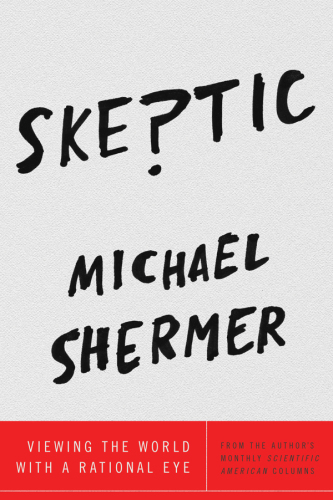
Skeptic
Viewing the World with a Rational Eye
فرمت کتاب
ebook
تاریخ انتشار
2016
نویسنده
Michael Shermerناشر
Henry Holt and Co.شابک
9781627791397
کتاب های مرتبط
- اطلاعات
- نقد و بررسی
- دیدگاه کاربران
نقد و بررسی

November 30, 2015
Shermer (The Moral Arc) makes a strong case for the value of the scientific endeavor and the power of rational thinking in these 75 brief essays, reprinted from his monthly column for Scientific American. His subjects include an exploration of the nature of science and a discussion of the principles of skepticism, with a particular focus on the appropriate interplay between data and theory. Among Shermer’s more engaging pieces are his thoughts on why so many intelligent people believe so many irrational ideas, the relationship between religion and science, and ways to distinguish science from pseudoscience. Shermer is not shy about expressing his opinions clearly and forcefully, as when he invokes Pauli’s Proverb, named after the physicist Wolfgang Pauli, who once critiqued a manuscript by saying, “This isn’t right. It’s not even wrong.” Degrees of wrongness are important to Shermer: “If you think that thinking science is unbiased is just as wrong as thinking that science is socially constructed, then your view is not even wronger than wrong.” Each entry is insightful, informative, and entertaining, though all are too brief to do more than whet the appetite. The most frustrating problem with this collection is that Shermer’s language, which might be evocative in a monthly column, wears thin when several pieces are read in quick succession. B&w images.

October 1, 2015
A collection of 75 of the Scientific American columns by author and gadfly Shermer (The Moral Arc: How Science and Reason Lead Humanity Toward Truth, Justice, and Freedom, 2015, etc.). The author turns a critical eye toward questions big, small, and trivial. One of the biggest: is religion a good thing? Studies and statistics give the answer: it depends. Though Western nations with high rates of religious belief and church attendance also have higher incidents of suicide, teen pregnancy, and sexually transmitted disease, as individuals, religious people are healthier, friendlier, happier, and more charitable. Simple math, not science, proves that extraordinarily rare events occur regularly. Despite 1 in 200,000,000 odds, someone must win the lottery, yet the winner never doubts that it's a miracle. Those with low opinions of eyewitness testimony, tabloid science, quacks who write bestsellers, paranormal phenomena, alien abductions, and folk medicine will find plenty of supporting arguments in this book. Most readers do not yearn for proof that actual events (9/11, the Holocaust, the moon landing) really happened, but deniers exist, and Shermer refutes them at every turn. Satanic cults, Bigfoot, and hermit geniuses who disprove Einstein turn out to be extremely difficult to find, and Shermer explains why. He admits that, sadly, most people admire science and the advancements that result from experimentation, but only a minority believe that a phenomenon is probably true if backed by evidence and unlikely if it isn't. Two-thirds of Americans prefer creationism to evolution, and 60 percent believe in extrasensory perception. Worse, belief in reason is uncool. In movies and TV, the skeptic is always wrong. Dense with facts, convincing arguments, and curious statistics, this is an ingenious collection of light entertainment for readers who believe that explaining stuff is a good idea.
COPYRIGHT(2015) Kirkus Reviews, ALL RIGHTS RESERVED.

December 1, 2015
Shermer is an all-media publicity platform of books, documentaries, TV appearances, lectures, and a column in Scientific American. The last has run since 2001, and this volume hosts Shermer's first 75 efforts. As with any columnist, spotting the inspiration points toward the main idea. In Shermer's case, personal memories, movies, and news accounts related to science, science books, and fads prompt his expositions. Their common theme, declares Shermer, is the interplay in science between data and theory. Shermer's essays particularly arraign the temptation, common to scientists and laypeople alike, to seize on a single observation as proof for a proposition, as in, I saw a UFO; therefore, aliens exist. More than debunking such illogic, entertaining as that is, Shermer extols skepticism as a tool for perceiving what is real. Are some people luckier than others? Does religious belief improve personal health or society at large? Several pieces tackle those questions, while others play off contemporary events, such as 9/11. Since those old SA issues have been recycled, revive the popular Shermer's writings with this collection.(Reprinted with permission of Booklist, copyright 2015, American Library Association.)

























دیدگاه کاربران